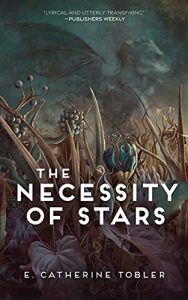Adrienne Martini Reviews Rosebud by Paul Cornell, The Necessity of Stars by E. Catherine Tobler, and And What Can We Offer You Tonight by Premee Mohamed
 Rosebud, Paul Cornell (Tordotcom 978-1-25076-539-0, $14.99, 110pp, tp). April 2022.
Rosebud, Paul Cornell (Tordotcom 978-1-25076-539-0, $14.99, 110pp, tp). April 2022.
Just to get it out of the way, the Rosebud in Paul Cornell’s Rosebud is a survey ship, not a sled. Said Rosebud has happened upon a mysterious black sphere out in space, and its digital inhabitants “a balloon, a goth, some sort of science aristocrat possibly, a ball of hands, and a swarm of insects” decide to investigate what this new phenomenon could be. And, yes, it gets weirder from there, as the five decant their electronic selves into bodies (one of which is Bob “Happy Clouds” Ross) and discover… well, spoilers, sweetie.
It’s a tricky story to find your way into, if only because Cornell throws you into the deep end of what it means to be, say, a ball of hands. No word is wasted here, and it builds into a moving story about what it means to be human, even after you have been transformed into a form that decidedly isn’t.
 The Necessity of Stars, E. Catherine Tobler (Neon Hemlock 978-1-95208-618-2, $12.99, 80pp, tp). July 2021. Cover by Marcela Bolivar.
The Necessity of Stars, E. Catherine Tobler (Neon Hemlock 978-1-95208-618-2, $12.99, 80pp, tp). July 2021. Cover by Marcela Bolivar.
Catherine Tobler’s novella The Necessity of Stars is a gem of a story about time and its passage. Every facet of Tobler’s tale has been cut to perfection, which makes it no surprise that it is up for a Nebula this year. Thanks to the Neon Hemlock edition of this story (and Premee Mohamed’s And What Can We Offer You Tonight; see below) more people can breathe in what Tobler has done.
Bréone Hemmerli is a diplomat for the United Nations. She’s been sidelined for years in one of the few pockets of France that is thriving despite decades of climate change and collapse. Bréone’s garden is lush with irises and tall trees even as she declines from age-related memory loss and physical decay. But something not-human lives in the garden and offers a chance to change Bréone’s course.
It’s in that choice that Tobler dwells, playing with perception and time. ‘‘Memory is a form of fiction – a story that keeps the days threaded together in proper order,’’ Bréone says, even as we wonder if she has threaded these days correctly. Tobler teases out this theme, as well as the interplay between predator and prey, with intentionally soft, almost sensual language that delivers a punch when the conclusion comes. The Necessity of Stars shows what shorter fiction can do.
 And What Can We Offer You Tonight, Premee Mohamed (Neon Hemlock 978-1-95208-625-0, $12.99, 80pp, tp). July 2021. Cover by Carly A-F.
And What Can We Offer You Tonight, Premee Mohamed (Neon Hemlock 978-1-95208-625-0, $12.99, 80pp, tp). July 2021. Cover by Carly A-F.
Premee Mohamed’s And What Can We Offer You Tonight is also a stunning (and Nebula-nominated) example of what short fiction can do – and does it in a completely different manner than The Necessity of Stars. Where Tobler’s work is dream-like and languid, Mohamed’s is sharp and full of contained fury. Both are gorgeous in their own ways.
Mohamed’s world is a brutal one where people deemed unuseful are culled by the authorities. If you are not fabulously wealthy or serving said one-percenters, you are not likely to live long. That makes Jewel’s job as a high-priced courtesan her literal lifeline. When a fellow sex worker is murdered by a client, then suddenly returns from the dead with nothing left to lose, Jewel is thrust into the mystery. Is solving it worth her own death?
The story, however, is only loosely about who the murderer is. Instead, it’s a barely controlled scream about power and abuse that infuriates and satisfies. If this were novel length, it would be overwhelming. But here, like Tobler, Mohamed distills keenly felt emotions into a heady shot.
Adrienne Martini has been reading or writing about science fiction for decades and has had two non-fiction, non-genre books published by Simon and Schuster. She lives in Upstate New York with one husband, two kids, and one corgi. She also runs a lot.
This review and more like it in the June 2022 issue of Locus.
 While you are here, please take a moment to support Locus with a one-time or recurring donation. We rely on reader donations to keep the magazine and site going, and would like to keep the site paywall free, but WE NEED YOUR FINANCIAL SUPPORT to continue quality coverage of the science fiction and fantasy field.
While you are here, please take a moment to support Locus with a one-time or recurring donation. We rely on reader donations to keep the magazine and site going, and would like to keep the site paywall free, but WE NEED YOUR FINANCIAL SUPPORT to continue quality coverage of the science fiction and fantasy field.
©Locus Magazine. Copyrighted material may not be republished without permission of LSFF.







